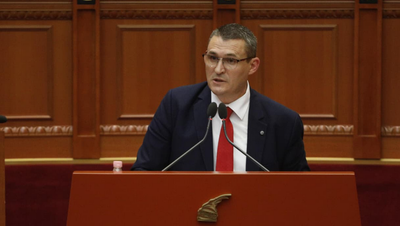
President Donald Trump created a White House agency that uses technology to improve governance. Albanian Prime Minister Edi Rama has outdone Trump by appointing an artificial intelligence robot to his cabinet.
Rama announced this month that “Diella” — which means “Sun” in Albanian — would join his government as a minister. Diella already appears to greet visitors on the government’s e-Albania website. Her new job: to oversee public procurement. She won’t need to be quite so incorruptible to outdo the current system. Last year, Albania scored 42 out of 100 on Transparency International’s Corruption Perceptions Index, which measures the prevalence of bribery, nepotism and other forms of corruption. (Denmark got the highest score, with 90; the United States ranked 65.) Rama says artificial intelligence can help award public tenders more fairly.
Rama, a 1.80m-tall populist, has been in power since 2013. He has pushed his country towards European Union membership while facing concerns about corruption and democratic backsliding.
Of course, naming Diella a “minister” is a stunt. Albania’s constitution requires that cabinet members be human; regardless of the role AI plays in allocating government resources, humans will still have to determine the government’s budget and priorities. The Albanian government has struggled with technology in the past. In 2022, Albania’s government services were paralyzed for weeks by a massive Iranian cyberattack that Rama compared to a bombing campaign. Would a cyberattack that “kills” a government minister prompt Rama to activate NATO’s mutual defense provision?
But using new technology to address corruption, even if only symbolically, is a useful incentive. Rather than waiting for the arrival of superhuman “artificial general intelligence,” governments around the world could look for ways to improve governance with artificial intelligence as it exists today.
In the United States, the government has lagged behind private industry in implementing artificial intelligence. About 150 bills on the topic were considered in state capitals last year, according to the National Conference of State Legislatures. But it’s not moving fast enough. As The Post has reported, China is far outpacing every country in the West in implementing artificial intelligence — in hospitals, factories and government offices.
It's early days in the age of artificial intelligence. But in a world of risk-averse government bureaucracy, Albania deserves praise for trying something new.






















